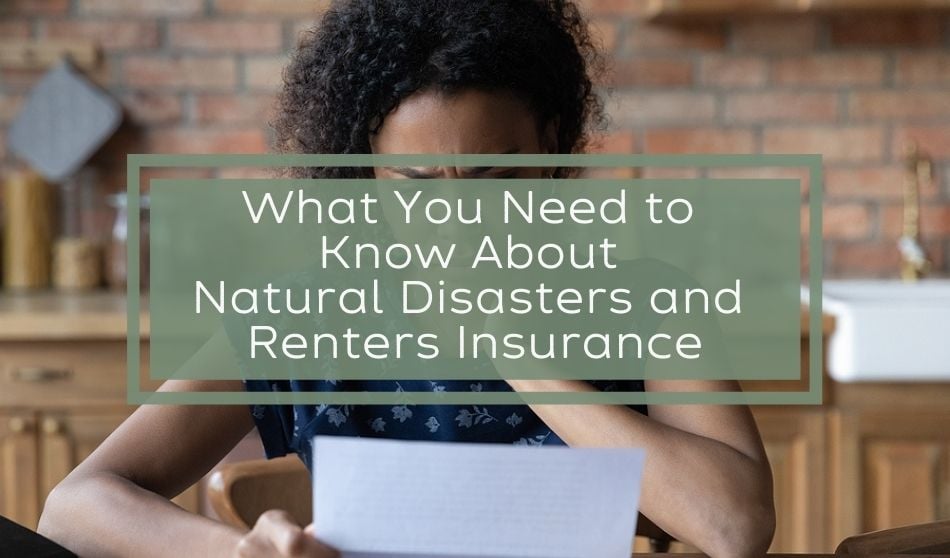Renters insurance is a vital and inexpensive protection that every renter needs to sufficiently protect not only personal belongings, but also, personal assets if someone were to sue.
Unfortunately, renters insurance is often misunderstood, and that can lead to some problems down the road–especially when renters are faced with a natural disaster. Here are the most vital things every renter should know about disasters and renters insurance.
Renters Insurance May Not Cover Every Natural Disaster
Similar to homeowners or landlord insurance, each policy can be nuanced about what it will–or will not– cover. For this reason, it is important to go over your particular policy on your own or with the provider to truly understand your coverage before an emergency occurs.
For instance, renters may be disappointed to learn that damage caused by flooding or earthquakes are often not covered in a typical renters insurance policy. That said, if you do not have an add-on or separate policy, there is a chance for your belongings to be covered under very specific circumstances. Loss through fire, explosion, or theft resulting from may still be covered even though that covered disaster resulted from an earthquake or flood. For instance, if a flood causes electrical damage that results in a fire, the personal belongings damaged as a result of that fire would likely be covered by a traditional renters insurance policy.
If you know you live in a flood zone or an area prone to earthquakes, and you would like to ensure that your belongings are covered in the event of one of these disasters, you do have options. First, some companies may offer coverage as an add-on to your current policy. If this is not an option, you can buy a separate flood or earthquake insurance policy for your personal property. These can be purchased through your current insurance provider or an additional insurer.
Renters Insurance Coverage Can Be Unavailable if a Disaster Risk is Present
Many renters forgo getting renters insurance expecting coverage to be too expensive or because they wrongly belie that their landlord’s insurance policy will cover any damage to their personal belongings. Unfortunately, many renters don’t realize their error until they are faced with a disaster.
While you likely know that you cannot get coverage on your stuff after a disaster has occurred, many renters do not realize that the risk of an imminent disaster can prevent them from obtaining a policy. According to Policy Genuis, a moratorium is when an insurance company stops issuing and updating policies because of an impending disaster or weather event — this is the reason why you can’t get or update home insurance before a hurricane. Unfortunately, this same issue holds true for renters in need of protection. If your belongings are at risk because of a nearby wildfire or an impending weather event, you are likely unable to get coverage. If you have an existing renters insurance policy, but would like to update or extend your coverage, a moratorium will prevent that as well.
What Should You Do When Facing an Insurance Moratorium?
Renters insurance moratoriums help insurance companies offset the financial risk of insuring homes in disaster-prone areas by not allowing renters to buy or extend coverage based on the presence of fires, or the weather forecast. The best way to guarantee protection in the event of a disaster is to get coverage before one occurs. Since a renters insurance policy’s monthly fee is nominal, there is no reason to wait to purchase a policy. Many disasters are seasonal (think wildfire season or hurricane season), and it is very important that you do not wait until this time to seek coverage. If you do, you could face a moratorium and have little or no options.
Keep in mind, however, that insurance moratoriums are put in place as a matter of company policy and are not issued at a statewide or industry level. This means that moratoriums decisions are made on a company-by-company basis, and there is always a chance that you can find a company not enforcing a moratorium for your area. While this is unlikely, if you find yourself in a situation where you need coverage, it can be worth looking into all of your options.
Make Sure You Understand Your Policy (Before a Disaster Hits)
Every renter should have renters insurance, but if you are a renter living in a disaster-prone region or climate you are particularly in need of a policy. Simply having a policy should offer you peace of mind, but to ensure that you are truly prepared before a natural disaster occurs, you need to make sure that you understand your policy entirely.
Very what your policy limits are and what exactly they will cover. For renters who live in a high-risk area, you may see certain limitations on their coverage or an increase in their premiums. Verify what your policy’s “loss of use coverage” looks like. Loss of use coverage pays for living expenses that occur if your home is not suitable to live in due to covered loss.
This will be the most common claim if the home or apartment is destroyed or uninhabitable due to a natural disaster. Be sure that you know ahead of time that your policy’s limits will cover food and hotel expenses in your area. For renters, if the property is completely destroyed, in some municipal areas the landlord does not need to provide temporary housing, and the tenant can stop paying rent. This is where your renters insurance policy can kick in to provide temporary shelter in the event of a disaster as you look for a new living situation.
Learn more about Landlord and Renter Rights After a Wildfire
Final Thoughts
Understanding your area’s risks and ensuring that your renters insurance will offer the coverage you need is key. Purchasing a policy–and fully understanding it–when your belongings are not at risk is vital. While it may seem like a chore to do that extra digging, taking care of it now will save you the headache and stress of navigating that info in the midst of attempting to make a renters insurance claim.





